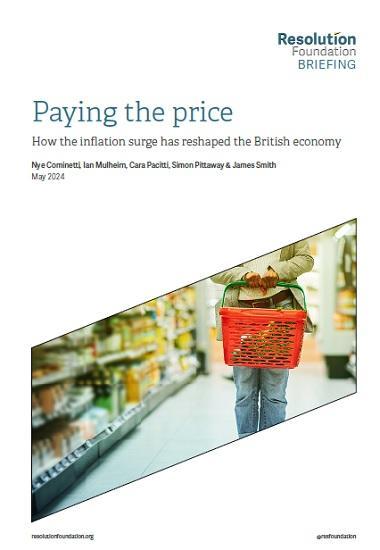Paying The Price - How The Inflation Surge Has Reshaped The British Economy
18th May 2024

The UK has experienced its highest inflation for more than 40 years, following Russia's invasion of Ukraine. But next week will bring the welcome news that inflation has returned close to the 2 per cent target for the first time since July 2021. In this briefing note we take a step back and look at how this huge shock to prices has reshaped our economy.
There has been a huge rise in the relative price of essentials. Wholesale energy prices increased by a factor of ten at their peak, although Government support limited the rise in retail prices to around 130 per cent. Food prices have risen by around a third more than the rise in the overall price level. As lower-income families spend much more on such essentials, this group has experienced the worst of the inflation.
The surge in inflation has hit earnings but not uniformly, this time with lower-paid workers taking less of a hit. Real wages have fallen 2.3 per cent between Q1 2021 and March 2024, equivalent to an annual wage cut of £790. For those at the 10th percentile of hourly pay, however, wages did not fall in real terms, helped by a minimum wage which almost kept pace with inflation in those years, along with tougher hiring conditions among lower-paying jobs.
Other elements of families' income have responded very differently to the rise in inflation. Annual real per-person benefit income increased by around £60 in real terms between 2021 and the end of 2023. While income from savings increased sharply as interest rates rose with this concentrated among older and richer households at least in cash terms.
Taking all of these factors together, real household disposable income per head was 1.1 per cent below its pre-pandemic level by the end of last year. Surprisingly, however, real per-person consumption has actually fallen by far more, down 4.7 per cent over the same period - with households saving £54 billion more in 2023 than if saving had returned to its 2019 rate. This is in stark contrast to the US experience, where real consumption per head is around 8 per cent above its pre-pandemic level.
Families have cut back on essentials during the cost of living crisis with real consumption of gas and electricity per head falling by as much as 11 per cent relative to its level in Q1 2022, with food consumption down as much as 7 per cent. But these cutbacks have not been large enough to offset rising prices meaning families have had to make cuts in other areas too.
But household balance sheets haven't improved for everyone with £2.1 trillion knocked off the value of aggregate wealth reflecting a big shift in asset prices, which has been the flipside to a huge rise in interest rates. This change has disproportionately fallen on older households, reducing intergenerational inequality.
Unlike other periods of high inflation, the public finances have also deteriorated. Public debt as a share of national income fell by 11 percentage points in the 1950s and by 7 percentage points during the oil shocks of the 1970s and early 1980s, but has risen by 6 percentage points between 2021-22 and 2023-24.
Read the full report HERE
Pdf 31 Pages
